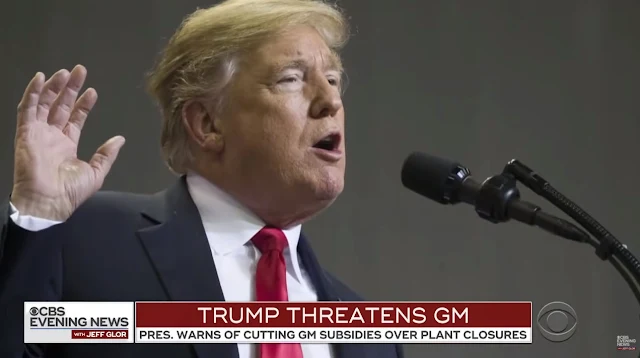VietPress USA (Nov. 28, 2018): In January 2018, Trump imposed tariffs on solar panels and washing machines of 30 to 50 percent. Later the same year he imposed tariffs on steel (25%) and aluminum (10%) from most countries. On June 1, 2018, this was extended on the European Union, Canada, and Mexico. The only countries which remain exempted from the steel and aluminum tariffs are Australia and Argentina. Separately, on July 6, the Trump administration set a tariff of 25% on 800 categories of goods imported from China worth $50 billion.
Morgan Stanley estimated that Trump's tariffs on steel, aluminum, washing machines, and solar panels, as of March 2018, covered 4.1% of U.S. imports. The tariffs angered trading partners, which implemented retaliatory tariffs on U.S. goods. Canada imposed matching retaliatory tariffs on July 1, 2018. China accused the U.S. of starting a trade war and on July 6 implemented tariffs equivalent to the $34 billion tariff imposed on it by the U.S. India plans to recoup trade penalties of $241 million on $1.2 billion worth of Indian steel and aluminium. Other countries, such as Australia, are concerned of the consequences of a trade war.
The actions were poorly received by the vast majority of economists; almost 80% of 60 economists surveyed by Reuters believed that tariffs on steel and aluminum imports would be a net harm to the U.S. economy, with the rest believing that the tariffs would have little or no effect; none of the economists surveyed believed that the tariffs would benefit the U.S. economy. In July 2018, the Trump administration announced it would use a Great Depression-era program, the Commodity Credit Corporation, to pay farmers up to $12 billion. This government assistance program aims to make up a shortfall as farmers lose sales abroad due to the trade war with China, the European Union, and other states.(Source: Wikipedia).
President Trump imposed tariffs on imported steel and aluminum from the European Union, Canada and Mexico, triggering immediate retaliation from U.S. allies and protests from American businesses and farmers.
The tariffs — 25 percent on steel and 10 percent on aluminum marking a major escalation of the trade war between the United States and its top trading partners.
Stung by the U.S. action, the allies quickly hit back. The E.U. said it would impose import taxes on politically sensitive items like bourbon from Senate Majority Leader Mitch McConnell’s home state of Kentucky. Mexico said it would levy tariffs on American farm products, while Canada zeroed in on the same metals that Trump had targeted.
Capping the extraordinary day, Canadian Prime Minister Justin Trudeau revealed that he had rejected an ultimatum from Vice President Pence that any new North American trade deal be renewed at five-year intervals.
In March 2018, Trump announced tariffs on more than $50 billion worth of Chinese goods — and China retaliated.
And now it looks like there’s no end in sight for this trade war. Trump told the Wall Street Journal that he was likely to increase tariffs on Chinese goods from 10% to 25%.
Trump and Chinese President Xi Jinping are scheduled to meet in November at the G-20 summit and try to seek common ground. But the cost of Trump's tariff war now effected to many companies in the United States, including General Motors (GM), Tesla, Ford, Farmers, etc...
General Motors recently announced its plan to cut more than 14,000 jobs. Earlier this year, the car manufacturer warned the Trump administration about the cost of his tariff war.
In a letter to the U.S. Department of Commerce, GM wrote: “Combined with the other trade actions currently being pursued by the U.S. Government … the threat of additional tariffs on automobile imports could be detrimental to our company.”
Yesterday, Trump lashed out at GM after its job reduction announcement and allegedly told its CEO that she “better” reopen plants in the U.S. soon.
Read this report from Yahoo News at: https://www.yahoo.com/news/yahoo-news-explains-cost-trumps-tariff-war-194426058.html
VietPress USA News
Yahoo News Explains: The cost of Trump’s tariff war

General Motors recently announced its plan to cut more than 14,000 jobs. Earlier this year, the car manufacturer warned the Trump administration about the cost of his tariff war.
In a letter to the U.S. Department of Commerce, GM wrote: “Combined with the other trade actions currently being pursued by the U.S. Government … the threat of additional tariffs on automobile imports could be detrimental to our company.”
Trump lashed out at GM after its job reduction announcement and allegedly told its CEO that she “better” reopen plants in the U.S. soon.
According to Axios, the trade war has cost more than $700 million in higher steel prices for GM alone.
But GM isn’t the only car company feeling its wallet get lighter. Ford announced that by 2020, it will only sell the Mustang and the Focus Crossover in North America.
Tesla CEO Elon Musk blamed tariffs, and said his company was “within single-digit weeks” of going bankrupt earlier this year.
The tariffs could also affect Apple. Trump said he’s considering imposing a 10% tariff on iPhones and laptops made in China.
Even farmers are feeling the effects of tariffs. According to the Federal Reserve Bank of Minneapolis, the owners of 84 Midwest farms have filed for bankruptcy in the last year.
How did this start?
The U.S. imposed steel and aluminum import tariffs on numerous countries this year, including some allies — such as Canada, Mexico and the European Union.
In March, Trump announced tariffs on more than $50 billion worth of Chinese goods — and China retaliated.
And now it looks like there’s no end in sight for this trade war. Trump told the Wall Street Journal that he was likely to increase tariffs on Chinese goods from 10% to 25%.
Trump and Chinese President Xi Jinping are scheduled to meet in November at the G-20 summit and try to seek common ground.
ooo
Hạnh Dương
www.Vietpressusa.us

